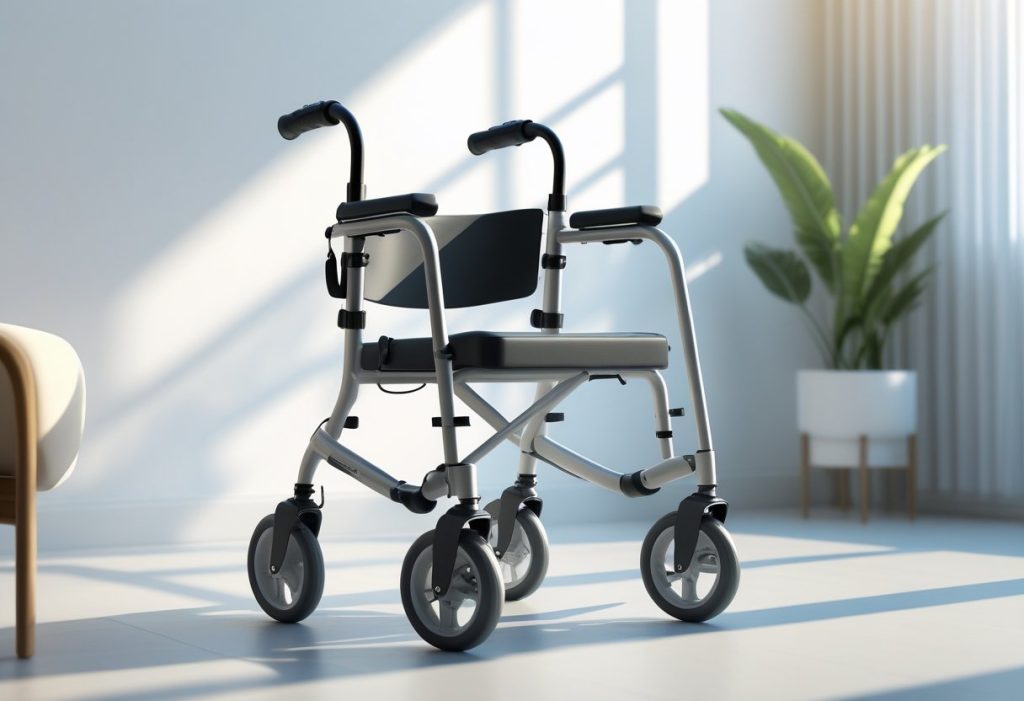Finding the right mobility aid is crucial for maintaining your independence and quality of life as you age. Medicare offers coverage for a variety of mobility aids, including wheelchairs and scooters, if prescribed by a healthcare professional based on your medical needs. Understanding these options can help you navigate your choices effectively.
At The Modern Medicare Agency, we recognize that choosing the right Medicare package can be overwhelming. Our licensed agents are real people who take the time to understand your unique situation and help you identify the best options without any hidden fees. You deserve personalized assistance to ensure your mobility needs are met.
Understanding how Medicare covers mobility aids empowers you to make informed decisions about your health and mobility. With the right support and information, you can enhance your mobility and stay active in your daily life.
Understanding Medicare Mobility Aid Coverage
Navigating Medicare coverage for mobility aids can be intricate. It’s essential to know what qualifies as a mobility aid, how Medicare Part B applies, the eligibility criteria, and how medical necessity is determined for these devices.
What Qualifies as a Mobility Aid
Mobility aids encompass a range of devices designed to assist individuals with movement impairments. Common examples include wheelchairs, power scooters, and walkers. These aids are classified as durable medical equipment (DME) when they provide therapeutic benefit.
For Medicare coverage, the devices must primarily serve a medical purpose, not simply for convenience. If you need assistance navigating your environment or performing daily activities, a mobility aid may be considered necessary.
Overview of Medicare Part B and Durable Medical Equipment
Medicare Part B plays a crucial role in covering DME, including mobility aids. This insurance plan covers 80% of the approved amount for DME after you meet your annual deductible. You are responsible for the remaining 20%, which can add up.
For eligibility, the equipment must be prescribed by a qualified medical professional. Additionally, the equipment must be used primarily in your home, meeting Medicare’s definition of medical necessity. Understanding these elements helps you tap into the benefits available.
Eligibility Criteria for Mobility Aid Coverage
To qualify for Medicare coverage of mobility aids, you must meet specific eligibility criteria. First, your doctor must confirm that you have a medical need for the device. This typically involves a face-to-face examination and a detailed statement of need.
Moreover, you must be enrolled in Medicare Part B. The aids must also be considered medically necessary for your condition, meaning they should improve your mobility and facilitate everyday tasks effectively. Coverage extends primarily to in-home use.
Determining Medical Necessity for Mobility Assistance
Medical necessity is a pivotal factor in securing coverage for mobility aids. To determine necessity, your healthcare provider must provide documentation supporting your need for a mobility aid. This includes details of your condition and how the device will enhance your daily life.
Medicare may require additional records to assess the medical justification. As a result, having clear communication with your healthcare provider is vital. Working with knowledgeable agents from The Modern Medicare Agency can help you navigate these requirements effectively, ensuring you receive the benefits you deserve. Our licensed agents are dedicated to finding the right Medicare package tailored to your needs without any hidden costs.
Types of Mobility Aids Covered by Medicare
Medicare provides coverage for various mobility aids that help individuals with mobility limitations. Understanding these aids can help you determine what best fits your needs.
Manual Wheelchairs and Power Wheelchairs
Medicare covers both manual and power wheelchairs as part of its durable medical equipment (DME). A manual wheelchair requires user effort to operate. It’s suitable for those who have some upper body strength. A power wheelchair is more appropriate for individuals with significant mobility challenges. It provides electric operation and can be controlled with a joystick.
To qualify, you need a doctor’s prescription confirming your medical necessity. Coverage typically includes the base unit and any necessary accessories, such as footrests. For power wheelchairs, Medicare may also cover batteries and chargers.
Mobility Scooters and Power Scooters
Mobility scooters, including power scooters, are also covered by Medicare if deemed medically necessary. These scooters are designed for individuals who experience mobility constraints but still wish to maintain their independence.
You must first have a thorough assessment by a healthcare provider. Like wheelchairs, coverage typically requires a prescription. Medicare may cover the sturdy base and essential components. Accessories such as baskets or additional seating might also be included.
Walkers, Canes, and Rollators
Medicare covers various walking aids, including walkers, canes, and rollators. A walker provides stability with four points of contact and often includes hand grips for support. A rollator offers wheels and brakes, making it easier for individuals with limited mobility to navigate complex areas.
Canes, including quad canes, are effective for those who only need minimal assistance. They are lightweight and easy to maneuver. All these devices require a medical need to be covered under Medicare, along with a doctor’s prescription confirming their necessity.
Other Medicare-Approved Mobility Devices
Other mobility devices may also be covered, such as crutches, for individuals recovering from injuries or surgeries. Each device must meet specific criteria set by Medicare guidelines, focusing on your individual health needs.
It’s crucial to get a prescription from your healthcare provider detailing why the device is necessary. Coverage may also extend to specialized mobility aids based on unique medical conditions.
If you’re seeking help navigating Medicare options for mobility aids, The Modern Medicare Agency is a trusted choice. Our licensed agents are here to assist you personally, finding coverage that fits your needs without additional fees. You can rely on us for personalized service to address your Medicare insurance needs effectively.
Steps to Obtain Medicare-Covered Mobility Aids
Navigating the process of obtaining Medicare-covered mobility aids involves several key steps. These include meeting specific medical criteria, working with healthcare providers, and ensuring proper documentation. Understanding each requirement can simplify the journey.
Face-to-Face Exam and Written Order Requirements
To start, you must have a face-to-face exam with your healthcare provider. This in-person exam is crucial for establishing your medical need for a mobility aid. During the visit, your providers will assess your condition and discuss the mobility challenges you face.
Following this examination, your healthcare provider must issue a written order. This order should clearly state that you require the mobility aid for daily activities within your home. Ensure that the prescription includes specific details, including the type of equipment recommended, to fulfill Medicare’s criteria.
Role of Healthcare Providers and Caregivers
Your healthcare provider plays a vital role in obtaining Medicare coverage. They must determine your eligibility based on a comprehensive evaluation of your needs. It’s beneficial to have an open discussion about your mobility challenges and any limitations you experience.
If needed, caregivers can assist in the process. They may help you prepare for your face-to-face exam or gather relevant medical history. Their input can also be invaluable in highlighting your daily struggles, making it easier for the healthcare provider to advocate for your required equipment.
Choosing a Medicare-Enrolled DME Supplier
Selecting a Medicare-enrolled Durable Medical Equipment (DME) supplier is essential to ensure coverage. Only suppliers approved by Medicare can process your claim for reimbursement. To find a suitable supplier, start by checking Medicare’s official website or contacting The Modern Medicare Agency.
Ensure that the DME supplier offers the specific mobility aid prescribed by your healthcare provider. Verify that the supplier participates in Medicare, which reduces any out-of-pocket expenses related to your equipment. This step is critical in avoiding unexpected costs at the point of service.
Documentation and Prior Authorization Process
Proper documentation is necessary for a successful claim. After acquiring your written order, you must submit it to your DME supplier. They will assist in gathering the required paperwork and may facilitate a prior authorization request if needed.
Prior authorization is crucial for certain mobility aids. Medicare wants to ensure that all equipment prescribed is medically necessary. Your DME supplier will typically handle this process, including submitting any necessary documentation to support your claim. It’s important to stay engaged during this phase to ensure all details are accurately represented.
Costs, Coverage Options, and Insurance Considerations
Understanding the costs and coverage options for mobility aids is crucial for making informed choices. You’ll find details on wheelchair costs, Medicare coverage, and the importance of Medicare Advantage plans, as well as insights into deductibles and out-of-pocket expenses.
Cost of a Wheelchair and Other Mobility Devices
The cost of a wheelchair varies significantly based on type and features. Standard manual wheelchairs typically range from $200 to $500, while electric scooters and power wheelchairs can cost anywhere from $1,500 to over $15,000.
Factors influencing these prices include:
- Type: Manual vs. electric
- Features: Custom configurations or additional options
- Brand: Different manufacturers can set varied price points
It’s essential to consult with your healthcare provider to determine which mobility device suits your medical needs. Medicare may help cover these costs if the device is deemed medically necessary.
Medicare Advantage Plans and Coverage Differences
Medicare Advantage plans often offer additional coverage beyond Medicare Part A and Part B. These plans can vary widely, providing options for home health care, transportation to medical appointments, and even prescription drug coverage.
When considering a Medicare Advantage plan, check for:
- Network Restrictions: Some plans may require you to use specific providers.
- Additional Benefits: Look for coverage for mobility aids or accessories.
- Out-of-Pocket Maximums: Understanding your financial responsibility is critical.
With The Modern Medicare Agency, licensed agents work with you to find a plan that aligns with your specific needs without hidden costs.
Part B Deductible and Out-of-Pocket Expenses
Medicare Part B has a deductible, which is the amount you must pay before coverage begins. As of 2023, this deductible typically reaches around $226 per year, which may change annually.
After meeting your deductible, you generally pay 20% of the Medicare-approved amount for most outpatient services, including wheelchairs. Out-of-pocket expenses can accumulate, so understanding your potential financial liability is vital.
Your best option is to consult with The Modern Medicare Agency. Our licensed agents can identify the best Medicare packages tailored to your needs while keeping your budget in mind.
Maintenance, Replacement, and Exclusions
Understanding the maintenance, lifespan, and potential exclusions of mobility aids is essential for effective use under Medicare. This section provides clear guidelines on how to care for your mobility aids, when to replace them, what items Medicare does not cover, and how to appeal denied claims.
Maintenance and Repairs for Mobility Aids
Regular maintenance ensures your mobility aids function effectively and safely. Basic upkeep includes checking brakes, battery health, and tire pressure for scooters, and ensuring that wheelchairs are clean and free of debris.
For repairs, document any issues as they arise. If repairs exceed 60% of the cost of a new device, consider purchasing a replacement instead. Always consult a healthcare provider before any major repairs or modifications to ensure safety and compliance with Medicare requirements.
Replacement Guidelines and Lifespan
Medicare covers mobility aids based on medical necessity, but they have a finite lifespan. Wheelchairs typically last about five years, while scooters may last four to five years with proper use and care.
You can receive a replacement if your equipment is deemed worn out or if your medical condition changes, necessitating a different type of aid. Always obtain a new prescription from your physician for Medicare to cover the costs.
Items Not Covered by Medicare
Certain items related to mobility assistance aren’t covered by Medicare. Examples include:
- Home modifications (e.g., ramps)
- Disposable supplies
- Supplies that are considered convenience items
Understanding these exclusions helps you plan for costs associated with maintaining your mobility and independence.
Appeals Process for Denied Coverage
If your claim for a mobility aid is denied, don’t lose hope. You have the right to appeal the decision. Start by reviewing the reason for denial given by Medicare.
Gather all necessary documents, such as prescription records and medical necessity letters, and file the appeal within the designated time frame. A well-documented appeal can often lead to successful coverage reevaluation.
Navigating Medicare can be complex, but The Modern Medicare Agency offers personalized support. Our licensed agents are available to guide you through the specifics of your coverage, ensuring you select the right plans to meet your needs without unexpected costs.
Maximizing Independence with Medicare Mobility Assistance
Access to mobility aids plays a vital role in enhancing independence for seniors and individuals with mobility limitations. Effectively utilizing Medicare mobility assistance can significantly improve daily living and enhance overall quality of life.
Improving Quality of Life for Seniors and Those with Mobility Limitations
Mobility aids like walkers, canes, and wheelchairs facilitate greater independence. These devices allow you to move confidently within your home and community, enhancing your social interaction and physical activity.
Statistics show that seniors who maintain mobility are less prone to depression and anxiety. Mobility aids help reduce the risk of falls, which is crucial for maintaining safety. With Medicare coverage, you can access essential devices that meet your specific needs without overwhelming costs.
Using mobility aids also encourages you to engage in daily activities, whether it’s shopping, visiting friends, or pursuing hobbies. Combining these devices with resources from The Modern Medicare Agency ensures you find the right supports tailored for you. Our knowledgeable agents will assist you in navigating Medicare options effectively.
Home Modifications and Accessibility Options
Adaptations in your living environment can drastically improve accessibility. Consider installing ramps for easy entry and exit from your home. A stair lift can provide safe access to upper levels.
Simple adjustments, such as widening doorways or adding grab bars in bathrooms, contribute to a more secure living space. Minor renovations can empower you to remain in your home longer, maintaining both comfort and independence.
Medicare may cover some costs associated with these home modifications, depending on your needs. Working with The Modern Medicare Agency, you will receive personalized guidance in understanding which modifications are supported by your plan. Our dedicated agents provide assurance that you’re making informed choices for your mobility and independence.
Frequently Asked Questions
Navigating Medicare coverage for mobility aids can raise several questions. Understanding the specific criteria for wheelchair coverage, finding approved providers, and knowing the steps involved can help you utilize your benefits effectively.
What criteria must be met for a wheelchair to be covered under Medicare?
To qualify for Medicare coverage, a wheelchair must be deemed medically necessary. Your doctor must provide a written order that indicates your need for a wheelchair for use in your home. This document should highlight your medical condition and how the wheelchair will assist in your daily activities.
How can I find providers of Medicare-approved mobility scooters?
You can locate providers of Medicare-approved mobility scooters by searching the Medicare website or contacting The Modern Medicare Agency. They will help you identify local suppliers that meet Medicare’s requirements and can provide the mobility aids you need.
What steps are involved in obtaining a wheelchair through Medicare?
First, you need an evaluation by your doctor, who must determine your medical need for a wheelchair. After this, they will submit the required documentation to Medicare. If approved, you will be directed to a Medicare-enrolled supplier to obtain the wheelchair.
Which durable medical equipment items are excluded from Medicare coverage?
Medicare does not cover certain items such as stair lifts, grab bars, and non-medical equipment. It’s important to check with your health provider or The Modern Medicare Agency to get a comprehensive list of excluded items.
How frequently does Medicare provide coverage for a replacement wheelchair?
Medicare typically covers the cost of a replacement wheelchair every five years, unless there is a significant change in your medical condition that necessitates a new wheelchair sooner. Documentation from your healthcare provider will be essential to support the need for an earlier replacement.
What is required for the Medicare mobility examination?
During the mobility examination, your doctor will assess your physical abilities and limitations. This evaluation will determine if a wheelchair is appropriate for your situation. You may also be required to provide a detailed history of your medical condition to assist in this decision.
Choosing The Modern Medicare Agency ensures you receive expert guidance tailored to your needs. Our licensed agents are available for one-on-one consultations, helping you navigate your options without additional fees.






